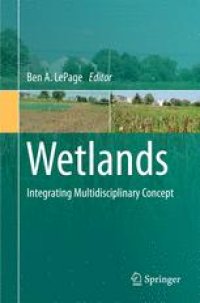
Ebook: Wetlands: Integrating Multidisciplinary Concepts
- Tags: Conservation Biology/Ecology, Landscape Ecology, Civil Engineering, Landscape Architecture, Waste Water Technology / Water Pollution Control / Water Management / Aquatic Pollution
- Year: 2011
- Publisher: Springer Netherlands
- Edition: 1
- Language: English
- pdf
The science of wetlands and our understanding of these complex ecosystems have improved considerably. The emergence of multidisciplinary strategies is providing new opportunities and innovative approaches to address issues such as climate change and coastal protection. This book, with contributions from 19 specialists from academia, government, and industry, provides a trans-disciplinary approach to the understanding wetlands science, drawing together a wide range of expertise. Topics covered include the physical aspects that shape different wetlands around the world, as well as wetlands ecology, regulation, policy, and related social and economic issues.
Featuring contributions from some of the world’s leading wetlands researchers and practitioners, this book provides an invaluable resource for undergraduate and post-graduate training in all aspects of wetlands management, conservation, and construction. It is also a useful auxiliary text for researchers working across disciplines in fields such as wetlands science, law, landscape architecture, environmental engineering, conservation ecology, and related disciplines.
The science of wetlands and our understanding of these complex ecosystems have improved considerably. The emergence of multidisciplinary strategies is providing new opportunities and innovative approaches to address issues such as climate change and coastal protection. This book, with contributions from 19 specialists from academia, government, and industry, provides a trans-disciplinary approach to the understanding wetlands science, drawing together a wide range of expertise. Topics covered include the physical aspects that shape different wetlands around the world, as well as wetlands ecology, regulation, policy, and related social and economic issues.
Featuring contributions from some of the world’s leading wetlands researchers and practitioners, this book provides an invaluable resource for undergraduate and post-graduate training in all aspects of wetlands management, conservation, and construction. It is also a useful auxiliary text for researchers working across disciplines in fields such as wetlands science, law, landscape architecture, environmental engineering, conservation ecology, and related disciplines.
The science of wetlands and our understanding of these complex ecosystems have improved considerably. The emergence of multidisciplinary strategies is providing new opportunities and innovative approaches to address issues such as climate change and coastal protection. This book, with contributions from 19 specialists from academia, government, and industry, provides a trans-disciplinary approach to the understanding wetlands science, drawing together a wide range of expertise. Topics covered include the physical aspects that shape different wetlands around the world, as well as wetlands ecology, regulation, policy, and related social and economic issues.
Featuring contributions from some of the world’s leading wetlands researchers and practitioners, this book provides an invaluable resource for undergraduate and post-graduate training in all aspects of wetlands management, conservation, and construction. It is also a useful auxiliary text for researchers working across disciplines in fields such as wetlands science, law, landscape architecture, environmental engineering, conservation ecology, and related disciplines.
Content:
Front Matter....Pages 1-1
Front Matter....Pages 1-1
Wetlands: A Multidisciplinary Perspective....Pages 3-25
The Necessity for Multidisciplinary Approaches to Wetland Design and Adaptive Management: The Case of Wetland Channels....Pages 27-34
Stream and Sediment Dynamics in Response to Holocene Landscape Changes in Lancaster County, Pennsylvania....Pages 35-65
A Paleoecological Perspective on Wetland Restoration....Pages 67-91
Front Matter....Pages 93-93
Classification of Wetlands....Pages 95-113
Ecological Functions of Wetlands....Pages 115-128
Multidisciplinary Approaches to Climate Change Questions....Pages 129-136
Monitoring and Assessment—What to Measure … and Why....Pages 137-152
Front Matter....Pages 153-153
Wetlands from a Psychological Perspective: Acknowledging and Benefiting from Multiple Realities....Pages 155-169
Wetlands Regulation: The Case of Mitigation Under Section 404 of the Clean Water Act....Pages 171-187
The Ramsar Convention....Pages 189-203
Managing Wetlands for Multifunctional Benefits....Pages 205-221
The Role of Landscape Architects and Wetlands....Pages 223-235
Floating Islands—An Alternative to Urban Wetlands....Pages 237-250
Back Matter....Pages 240-240
The science of wetlands and our understanding of these complex ecosystems have improved considerably. The emergence of multidisciplinary strategies is providing new opportunities and innovative approaches to address issues such as climate change and coastal protection. This book, with contributions from 19 specialists from academia, government, and industry, provides a trans-disciplinary approach to the understanding wetlands science, drawing together a wide range of expertise. Topics covered include the physical aspects that shape different wetlands around the world, as well as wetlands ecology, regulation, policy, and related social and economic issues.
Featuring contributions from some of the world’s leading wetlands researchers and practitioners, this book provides an invaluable resource for undergraduate and post-graduate training in all aspects of wetlands management, conservation, and construction. It is also a useful auxiliary text for researchers working across disciplines in fields such as wetlands science, law, landscape architecture, environmental engineering, conservation ecology, and related disciplines.
Content:
Front Matter....Pages 1-1
Front Matter....Pages 1-1
Wetlands: A Multidisciplinary Perspective....Pages 3-25
The Necessity for Multidisciplinary Approaches to Wetland Design and Adaptive Management: The Case of Wetland Channels....Pages 27-34
Stream and Sediment Dynamics in Response to Holocene Landscape Changes in Lancaster County, Pennsylvania....Pages 35-65
A Paleoecological Perspective on Wetland Restoration....Pages 67-91
Front Matter....Pages 93-93
Classification of Wetlands....Pages 95-113
Ecological Functions of Wetlands....Pages 115-128
Multidisciplinary Approaches to Climate Change Questions....Pages 129-136
Monitoring and Assessment—What to Measure … and Why....Pages 137-152
Front Matter....Pages 153-153
Wetlands from a Psychological Perspective: Acknowledging and Benefiting from Multiple Realities....Pages 155-169
Wetlands Regulation: The Case of Mitigation Under Section 404 of the Clean Water Act....Pages 171-187
The Ramsar Convention....Pages 189-203
Managing Wetlands for Multifunctional Benefits....Pages 205-221
The Role of Landscape Architects and Wetlands....Pages 223-235
Floating Islands—An Alternative to Urban Wetlands....Pages 237-250
Back Matter....Pages 240-240
....